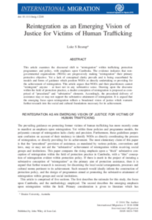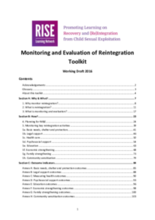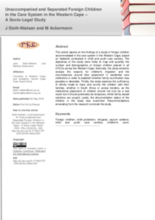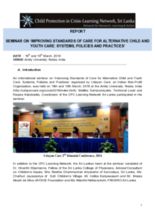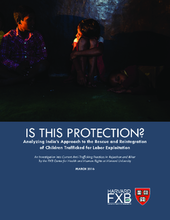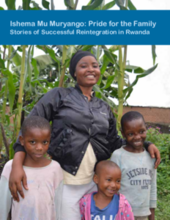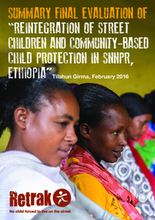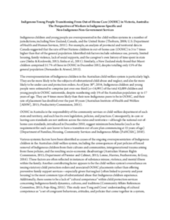Displaying 811 - 820 of 992
This article examines the discoursal shift to “reintegration” within trafficking protection programmes and policy, with emphasis upon Cambodia.
This toolkit is primarily for individuals working at organisations that assist and support children and young people in their reintegration back into families and communities. The toolkit will be of particular relevance to individuals who are involved in the planning of programmes and the implementation of monitoring and evaluation activities. The toolkit provides ideas, examples and suggestions of how organisations could collect monitoring and evaluation data with, from and about the children and young people they work with.
This article reports on the findings of a study of foreign children, including from Burundi, accommodated in the care system in the Western Cape, based on fieldwork conducted in child and youth care centres (CYCCs).
This document reports on Udayan Care's international seminar on ‘Improving Standards of Care for Alternative Child and Youth Care: Systems, Policies and Practices’
This report provides a comprehensive and critical analysis of the Indian government’s efforts to rescue and reintegrate children trafficked for their labor.
This report highlights stories of some children, youth and families who have been assisted under the Ishema Mu Muryango program. While each of their stories is unique, all highlight some common themes about institutionalization and child abandonment in Rwanda.
The goal of this final evaluation is to build on the mid-term review of a 3-year pilot community project established to address some of the push factors that were leading many children to come to the city of Addis Ababa from Ethiopia’s southern region (SNNPR).
This paper uses findings from interviews with 169 children and young people across 11 local authorities in England and 5 Social Work Practices (SWPs), undertaken as part of a 3-year national matched control evaluation of pilot SWPs, to identify key elements of good quality practitioner relationships with children or young people.
This report is the third and final in a series of reports exploring the economic consequences and issues for youth aging out of care in British Columbia, Canada. The purpose of the report is to estimate the incremental costs of support measures that can improve outcomes and to compare these costs to the benefits they may generate.
This article investigates the current leaving care and post-care supports that are available to Indigenous care leavers in Australia.

